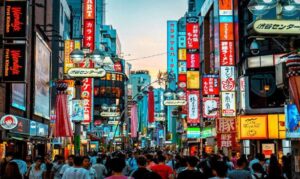
Unit 16
Charming Cities: Tokyo
出國旅遊/旅行攻略
Travel Abroad/Travel strategy
BRAIN STORM
Share your ideas with your teacher and try to make sentences.
What do you imagine when you hear the place Tokyo?
VOCABULARY
Repeat these sentences after your teacher.
1. mosaic (n.) 馬賽克;不同要素組合體
Wow! You created a beautiful mosaic!
哇!您創建了一個美麗的馬賽克!
2. culinary (adj.) 烹飪的
I love seeing culinary shows!
我喜歡看烹飪節目!
3. palate (n.) 味覺,品嘗力
Tokyo has a culinary scene for any palate.
東京有各種口味的美食。
4. salarymen (n.) 上班族
Salarymen often visit pubs in Tokyo.
薪水工人經常去東京的酒吧。
5. gastropub (n.) 美食吧
I would love to go to a gastropub!
我很想去一家美食酒吧!
6. shop ’til you drop (adj.) 盡情地購物
Today, you will shop ‘til you drop!
今天,讓你盡情地購物!
7. mecca (n.) 勝地,令人嚮往的地方
Tokyo is the mecca of shopping.
東京是購物的聖地。
8. electrifying (adj.)令人興奮的
The President delivered an electrifying speech.
總統發表了一次激動人心的演講。
Dialogue
Read the dialogue aloud with your teacher.

The megacity of Tokyo is a mosaic of technology, culture and tradition.
With more Michelin-star restaurants than any other city, Tokyo has a culinary scene for any palate.
You can fine dine at Master Jiro’s sushi bar, or join the crowds of “salarymen” at an izakaya, a Japanese style gastropub.
If you’re a shopaholic, shop ’til you drop at Ginza’s posh boutiques or the bustling area of Harajuku.
Harajuku is also the mecca of Japanese pop-culture. You can spot many locals dressed in cosplay from their favorite manga or anime.
For history buffs, check out the Imperial Palace, the Samurai Museum, or rent a kimono and visit the temple at Asakusa.
Then, watch the sunset over Mt. Fuji from the top of Tokyo’s Skytree Tower, the second tallest structure in the world.
If you’re feeling young at heart, head back over to Shibuya for an electrifying nightlife. Just don’t forget your wallet!
東京這座大都市集科技、文化和傳統於一身。
東京擁有比任何城市都多的米其林星級餐廳,這裡的美食可以滿足各種口味的人。
你可以到壽司大師小野二郎的壽司店享用高級美食,也可以加入到眾多的”上班族”之中,去日式美食酒吧——居酒屋飽餐一頓。
如果你熱衷購物,去銀座的高檔精品店或者原宿的繁華街區盡情地買吧!
原宿還是日本的流行文化勝地。 你能看到很多當地人打扮成他們最喜歡的動漫角色。
如果你是歷史愛好者,去看看皇居和武士博物館吧,或者租件和服去參觀淺草的寺廟。
然後,在世界第二高建築——東京晴空塔上欣賞富士山的落日。
如果你感覺活力無限,那就回到澀谷體驗刺激的夜生活吧。 可別忘了帶錢包!
Grammar
Using the subordinate clause “With…”
In this lesson, we saw the subordinate clause “With more Michelin-star restaurants than any other city.” This “with” clause gives support to the claim of the sentence: Tokyo has a culinary scene for any palate. This is one common way to use this “with” clause.
Another way to use this type of clause is like the phrase “because of.” It can give an explanation or a concrete reason for a change, behavior or other fact (e.g., With the Olympics coming, Tokyo is improving its infrastructure).
This type of “with” clause is mostly used before the main clause of the sentence, especially in written or formal English.
1. With a well-developed transportation system, Shanghai is very easy to get around.
2. With more gold medals than any other athlete, it’s no wonder Michael Phelps is considered the greatest Olympian in history.
3. With the cold weather lately, I’ve been bundling up before going outside.
DISCUSSION
Make a conversation with your teacher.
1.What would you do if you were given the chance to stay in Tokyo for a week?



